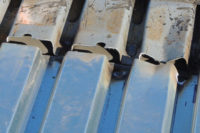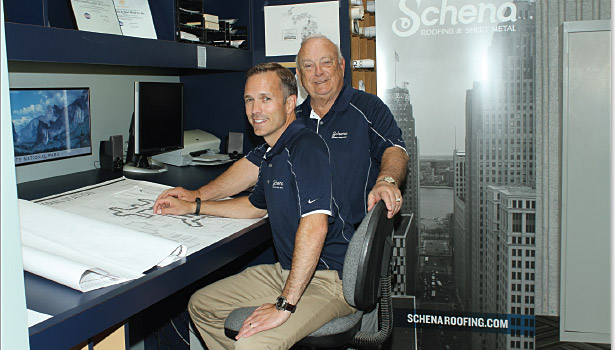On the Right Road: At Schena Roofing, It all Begins With a Vision of the Future

The team at Schena Roofing & Sheet Metal Company covers all of Michigan, as well as parts of Indiana, Ohio and Illinois.

In 2006, Anthony Schena (left) took the helm of the company, which was founded in 1969 by his father, George Schena. Photos by Karen McConnell.

Schena’s team approach helps it excel on tough projects such as this re-roofing application at the Detroit Institute of Arts. Photo by Chris King.



Schena Roofing & Sheet Metal Company has been a fixture in Chesterfield, Mich., for 45 years. The union-affiliated commercial roofing and sheet metal contractor covers all of Michigan, as well as parts of Indiana, Ohio and Illinois. As a very rough winter turns to spring, CEO Anthony Schena is looking at a strong backlog of work and projects the company will do $10-12 million worth of business this year. According to Schena, business is booming and morale is high — exactly as he envisioned in the teeth of the Great Recession, which put the company to the ultimate test.
The recession was particularly tough on the Detroit area, as the automotive sector was extremely hard hit. “In 2009, it got to be devastating,” Schena remembered. “I’d say 80 percent of this industrial subdivision was gone. Every day it was a new company going out of business, and it was getting frightening. I was wondering where not just my company was going, but our industry and the whole state. It was time to start really making some tough decisions.”
Schena laid off some members of the office staff and gathered the company’s employees for a meeting. He said, “We need to tighten our belts. I know that the strong will survive, and whoever gets through this recession is going to come out on top because there is going to be a lot of work that needs to get done.”
He outlined his plan to restructure the company. “Everybody had to chip in and take on new responsibilities, and everyone took pay cuts,” Schena recalled. “I had already had employees come to me and say, ‘I’m in this for the long haul. What can I do to help? Tell me. If you need me to take a pay cut, I’ll do it.’ Everybody that was here willingly took a pay cut to keep themselves employed and do what they could to get this business going. And that’s when I knew I had something pretty darn special here. It wasn’t quite working right. People weren’t in the right spots. It wasn’t a smooth road. I knew we needed to create a new vision of Schena Roofing — we needed to find out who we wanted to be and where we had to go.”
The image stayed with Schena. At a second meeting, he put two pictures up on the wall. The first showed a road intertwined with other roads going in different directions, congested with traffic. He pointed to it and said, “I feel like this is the road we are on right now.” He pointed to the second picture, which showed a single road, lined with trees under a beautiful sunset, and said, “I think this is the road that we want to be on.”
“So we started to plan and create a vision for our road to greatness,” Schena said. “We began to work as a team to restructure Schena Roofing. We put together a plan, we put together a vision, and we put in a lot of hard work.”
The hard work soon began to pay off. “In that first year, our sales grew 50 percent,” he said. “Our service department doubled. Everything seemed to be going so much smoother. Everyone seemed to be in the right spot for their talents and skills. Everybody was happy and excited to see things moving along, working the way we had envisioned.”
The Beginning
Schena Roofing & Sheet Metal was founded in 1969 by George Schena, Anthony’s father. He did a lot of work for a customer who was building bowling alleys, and eventually married his secretary. “That was how he met my mom,” Anthony said. “My mom did the payroll while juggling babies. She retired when I was born, and the company continued to grow from there.”
Growing up, Anthony Schena didn’t seriously consider a career in roofing. He earned a degree in finance from Oakland University and landed a job at NBD Bank in 1993. He later accepted a job with Ford, which would have required him to relocate and travel extensively. His father, who was recovering from a stroke, asked him to consider joining the company. “The lesson I learned in the banking business was that business — no matter what you’re selling, whether it’s a service or a product — is all the same animal,” Schena said. “I thought, maybe I’m missing out on a really good opportunity. So I came in and talked to some of the people who were working here, and my dad was getting himself back into better health, and I thought, ‘OK, I’m going to give it a shot.’ That was in 1995, and nearly 20 years later, here I sit.”
Schena bought the company in 2006. His father is retired but still serves as a mentor and advisor. Schena points to the recession as the company’s biggest test, and he points to the decision to restructure the company as its pivotal moment.
According to Schena, the key to the restructuring plan was gathering input from everyone about the problems they were facing and collaborating to find solutions. They redefined all of the company’s processes one at a time. “We worked hard together and created a team,” he said. “We’d say this is one of the problems we have. Let’s come together to figure it out and create a process that works. We did that a few years ago with executing jobs. The communication wasn’t smooth and things were falling through the cracks, so we all sat down around the table with a piece of paper and I started writing down step 1, step 2, step 3, and we created a process to executing a job. That’s one example. And that’s what everybody did for every part of our company.”
The company still uses that process when problems come up or if plans are made to expand and add staff members. “It’s very important to visualize how you want things to be and then fill in that blank in between to get there,” Schena said.
Schena credits his entire team for helping to turn the company around during the recession. He also acknowledges the help of a higher power. “I have a wonderful faith — I’m Catholic,” he said. “A friend of mine with an organization called the Men of the Sacred Heart offered to bless our business, so I invited him in, and invited my mom and dad to come, and I invited anyone who wanted to come for the blessing. I was surprised that most of my office staff came. It was a beautiful process.”
The company usually starts each week with a short prayer meeting. Participation is voluntary. “We just get together and talk about what’s going on in our lives, and we have a little prayer,” Schena said. “We’re probably in there for five or 10 minutes, and we go about our way. I think that’s something that makes us unique, and it really has bound us all together.”
Tough Projects
The sense of teamwork helps the company succeed in the service and maintenance arena and overcome obstacle with tough projects. “Service is definitely something we excel at,” Schena said. “It’s tough to do. A lot of businesses don’t take it on because it’s a significant responsibility and there’s a lot of detail to a service department. You need the right people with the right personalities that can take it on. You need to be diligent and efficient and organized.”
The service department also has to be versatile and well trained, as technicians work on such a wide variety of systems. “We’ve got a great superintendent who works very hard with the men to make sure they are doing the jobs right. We have great foremen who are very conscientious. I think that team effort goes across every department. We’re all part of a team. Everybody works together to help each other achieve a common goal.”
The team mindset extends to the company’s customers. “We take an interest in what they do and understanding their business so we can figure out how we can service them best,” Schena said. “We don’t look at the customer as the customer for one job. We want a customer for life. So we make sure we give every customer great service, which means being on time, responding to phone calls, being there when they need us. We want to take the roofing stress away from them — especially property managers. They have so much to deal with on a day-to-day basis. If we can take one of those things away and make them feel comfortable that they have a competent company taking care of them and watching their back, then we’ve done our job.”
Protecting the client’s assets is always a key concern. At the Detroit Institute of Arts, the stakes were particularly high. “We had to be very conscious of not causing any breaches to the sensitive environment of the artwork, and we didn’t want to disrupt the patrons or any operations of the business,” Schena said.
The company also made some suggestions to keep the project under budget. “We always try to give the customer some options when we think that we can provide a good cost savings, and we gave them an alternate for the recover that saved them some money, and they loved it and jumped on it.”
The Guardian Building in Detroit posed another set of challenges. The 36-story building, which was originally finished in 1928, has multiple roof levels, and access was a critical issue. The upper roofs were not accessible by a crane, and the freight elevator stopped three floors short of the roof. “We used 55-gallon drums and carts to bring the debris down to the level where we could use the freight elevator,” said Schena. “We had to construct ramps over the steps. And we had to do all this without disrupting the operations of the building, as Wayne County’s offices are in there.”
The job went off without a hitch. “The maintenance staff did a great job assisting us,” Schena said. “Honestly, the people in the building didn’t even know anything was going on. The project was very smooth.”
Helping the Community
Schena Roofing also pitches in to help on community service projects, including donating roofing work for organizations such as Life Remodeled. The company also adopts a family every year at Christmas. In 2012, a church recommended the family of a single mother that was in dire need. They lacked essentials including clothes, furniture, beds and kitchen utensils, as well as items including a microwave and a washer and dryer. “The kids were sleeping on the floor,” Schena said. “The mom had to ride a bus for an hour and a half each way to get to work.”
Once again, the team members at Schena Roofing put their heads together and formulated a plan. “We all said, ‘There’s no question we have to help these people,’” Schena said. “But it was a tall order. We knew we couldn’t do it alone, so we reached out to different people that we knew.”
Workers contacted their spouses and got other companies to pitch in to help. Volunteers donated tables, chairs, beds, dressers, clothes, food, pots and pans. “We outfitted the whole house and there was cash left over to help them with the rent,” Schena said. “We got them a washer and dryer, and we even gave them a car so she didn’t have to take the bus back and forth to work.”
Schena pointed to the effort as one of his most rewarding experiences. “It was a challenge that we all took on, and I can’t tell you what an amazing feeling it was when we went there with a trailer and unloaded everything,” he said. “It was wonderful to be able to give some of our success back to help somebody who really and truly needed it.”
Coincidentally — or not so coincidentally — that was right around the time when Schena realized his company was finally on the right road. “I have quarterly meetings with our staff, and at one of those meetings I got to the point where I knew we were on that road,” Schena said. “Everything seemed to be working, and I said, ‘Guys, I think we got here. We’re finally on that right road. Now we have to stay here. We have to keep focused and keep doing what we’re doing.’”
Schena believes his team has what it takes to do just that. “I’ve had people come in here and sit down and talk with me — suppliers, manufacturers, customers — and they say, ‘Gosh, I walk in here and something just feels different,’” he said. “One person said, ‘Everybody in here is happy, and they are so nice. I’ve got to tell you, that doesn’t happen in every company you go to.’ I’ve heard that many times, and I’m more proud of that than anything else. When somebody is busy and overloaded, someone else jumps in and says, ‘Hey, let me work on that with you. Let’s get this knocked out.’ Everybody here goes out of their way to help one another and cares about one another. And to me, that’s more important than any job we can land — that we have a great group of people that works together. If we’ve got that, we can do anything.”
Looking for a reprint of this article?
From high-res PDFs to custom plaques, order your copy today!











